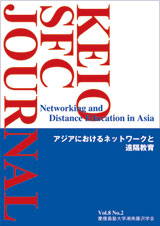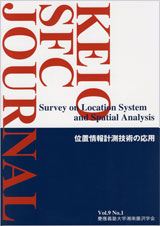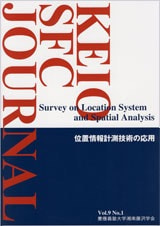- HOME
- KEIO SFC JOURNAL
- Vol.8 No.2

KEIO SFC JOURNAL Vol.8 No.2 Networking and Distance Education in Asia
published on 2009.03
-
Real Time Communication and Collaboration
Sinchai Kamolphiwong Associate Professor, Center for Network Research (CNR), Department of Computer Engineering, Faculty of Engineering, Prince of Songla University Thossaporn Kamolphiwong Associate Professor, Center for Network Research (CNR), Department of Computer Engineering, Faculty of Engineering, Prince of Songla University Suthon Sae-Wong Lecturer, Center for Network Research (CNR), Department of Computer Engineering, Faculty of Engineering, Prince of Songla University In this paper, we describe our experiences from a collaborative project, called ANGKOR. We conducted real-life experiments on setting up remote teaching and learning in medical sciences, which comprises of rich media contents with mandatory interactive sessions. Remote teaching experiments were conducted from the School of Medicine, University of Pierre et Marie Curie (UPMC) in France to the University of Health Sciences in Cambodia (UHSC). The network being used for the project poses a real technical challenge, where a combination of very high speed connectivity from France to Japan with relatively low speed satellite Internet from Japan to Cambodia. Rich multimedia content for medical lessons is sent using digital video transport system, or DVTS, from UPMC. Three main technical contributions from this project include the use of IP multicast in heterogeneous environment; the real-time media stream frame reductions and the provisions for mobile classrooms. Based upon our experimental results from this project, we propose a framework for a remote classroom system over heterogeneous network environment.
Download this article (PDF): SFCJ8-2-01.pdf -
Performance Evaluation of RObust Header Compression (ROHC)
Way-Chuang Ang Research Officer, School of Computer Sciences, Universiti Sains Malaysia Tat-Chee Wan Senior Lecturer, School of Computer Sciences, Universiti Sains Malaysia Kotaro Kataoka Doctoral Program, Graduate School of Media and Governance, Keio University Chee-Hong Teh Research Officer, School of Computer Sciences, Universiti Sains Malaysia This paper describes the activities of the AI3 Project in SFC. Using satellite links, this project gives contributions to the society by: developing Internet technologies using satellite links, operating an Internet infrastructure for southeast Asian region including a multicast network, and distance education.
Download this article (PDF): SFCJ8-2-02.pdf -
ANGKOR: A Real-time Remote Classroom on Research and Education Networks
Kanchana Kanchanasut Professor, Computer Science, School of Engineering and Technology Director, Internet Education and Research Laboratory (IntERLab), Asian Institute of Technology Jean-François Bertholon Professor, Faculté de Médecine, Université Pierre et Marie Curie, Paris 6 Jean-François Vibert Professor, Faculté de Médecine, Université Pierre et Marie Curie, Paris 6 In this paper, we describe our experiences from a collaborative project, called ANGKOR. We conducted real-life experiments on setting up remote teaching and learning in medical sciences, which comprises of rich media contents with mandatory interactive sessions. Remote teaching experiments were conducted from the School of Medicine, University of Pierre et Marie Curie (UPMC) in France to the University of Health Sciences in Cambodia (UHSC). The network being used for the project poses a real technical challenge, where a combination of very high speed connectivity from France to Japan with relatively low speed satellite Internet from Japan to Cambodia. Rich multimedia content for medical lessons is sent using digital video transport system, or DVTS, from UPMC. Three main technical contributions from this project include the use of IP multicast in heterogeneous environment; the real-time media stream frame reductions and the provisions for mobile classrooms. Based upon our experimental results from this project, we propose a framework for a remote classroom system over heterogeneous network environment.
Download this article (PDF): SFCJ8-2-03.pdf -
The Activities of the AI3 Project in SFC
Haruhito Watanabe Research Associate, Graduate School of Media and Governance, Keio University This paper describes the activities of the AI3 Project in SFC. Using satellite links, this project gives contributions to the society by: developing Internet technologies using satellite links, operating an Internet infrastructure for southeast Asian region including a multicast network, and distance education.
Download this article (PDF): SFCJ8-2-04.pdf
-
An Educational Development on Learning Paradigm of Regionwide IT Hands-on Workshop
Patcharee Basu Senior Visiting Researcher, Keio Research Institute at SFC Shoko Mikawa Assistant Professor, Graduate School of Media and Governance, Keio University Achmad Basuki Doctoral Program, Graduate School of Media and Governance, Keio University Keiko Okawa Professor, Graduate School of Media Design, Keio University This paper presents an educational development that extends the boundary of traditional distance learning approach to incorporate computer laboratory for live IT hands-on lessons for learners in developing countries. The proposed approach contributes to widen the IT learning opportunities in Asia where shortage of local teaching resources is the restricted condition. The distance learning environment is designed to deliver high-quality lectures and support multi-point live conversations in a distributed classroom. Computer virtualization technology and large-scale computing laboratory are integrated to provide laboratory environments for region-wide learners. The proposed approach has been proven feasible and effective through the actual implementations and evaluations of Asia-wide workshops in 2006 and 2008.
Download this article (PDF): SFCJ8-2-05.pdf -
Sustainable Education Collaboration Architecture on Digital Infrastructure
Shoko Mikawa Assistant Professor, Graduate School of Media and Governance, Keio University Keiko Okawa Professor, Graduate School of Media Design, Keio University Jun Murai Professor, Faculty of Environment and Information Studies, Keio University This paper presents the first sustainable education collaboration architecture that interconnects universities to build multilateral learning environment to foster students to become cosmopolitans. The proposed approach is taken from technical and administrative aspect to enable effective and sustainable education collaborations among the universities. The distance education system enabled any contents provider or university to technically participate in the education collaboration. The collaboration guidelines enabled other distance education systems to interconnect with the proposed system as well as enabling official education collaboration among the partners within the proposed system. The operator development enabled the sustainability and autonomy of the proposed architecture. This research is unique that it pursues how to sustain the education collaboration region-wide by integrating the three aspects: distance education system, guideline development and operator development, while other work focuses on only one or two components. The six years of experience conducting the education collaborations proved the feasibility, sustainability, and effectiveness of the proposed architecture.
Download this article (PDF): SFCJ8-2-06.pdf
-
Northeast Asian Multinational Enterprise and Environmental Safeguard - Case study of NSC and POSCO
Bae Yoon Doctoral Program, Graduate School of Media and Governance, Keio University The purpose of this paper is to examine recent developments concerning the multinational enterprises' strategies in the environmental issues in North Asia. The multinational enterprises have played an important role in economic development among nations. At the same time, they also have been questioned for their roles in the environmental issues in the areas where they have actively invested, and accused of "exporting pollutions." However, the recent multinational enterprise is introducing "Corporate Social Responsibility" including the environmental cooperation into corporate strategy. I argue in this paper that changes in the managerial environment (international economy, national policies, or corporate management styles) have promoted the introduction of "Corporate Social Responsibility.
Download this article (PDF): SFCJ8-2-07.pdf -
What is Applied Political Philosophy? - A Kantian Perspective
Yasutake Miyashiro Doctoral School, Political Philosophy and Ethics, University of Paris- Sorbonne(Paris IV) The purpose of this paper is to examine recent developments concerning the multinational enterprises' strategies in the environmental issues in North Asia. The multinational enterprises have played an important role in economic development among nations. At the same time, they also have been questioned for their roles in the environmental issues in the areas where they have actively invested, and accused of "exporting pollutions." However, the recent multinational enterprise is introducing "Corporate Social Responsibility" including the environmental cooperation into corporate strategy. I argue in this paper that changes in the managerial environment (international economy, national policies, or corporate management styles) have promoted the introduction of "Corporate Social Responsibility.
Download this article (PDF): SFCJ8-2-08.pdf -
China's Foreign Policy in the Early 1960s - From the policy toward France
Subaru Yamakage Doctoral Program, Graduate School of Media and Governance, Keio University This paper focuses on China's foreign policy toward France in the early 1960s. Sino-Soviet conflict forced to change China's foreign policy in both security and economy. With these changes, relations with European nations, especially with France, became very important for China's foreign policy. Under this situation, China decided to establish diplomatic relations with France in 1964, and France became the first nation in Western Europe which established diplomatic relations with China. The purpose of this paper is to clarify how China positioned their policy toward France in their own foreign strategy, and also to analyze China's recognition of the obstacles to establish Sino-France diplomatic relations.
-
Police Reform in Bosnia and Herzegovina From Security Sector Reform perspective
Takefumi Nakamura Senior Visiting Researcher, Keio Research Institute at SFC This article analyses police reform in Bosnia and Herzegovina from a Security Sector Reform perspective, which has gained more popularity in relation to national peacebuilding since the late 1990's . At first, three elements (ownership, norms, and efficiency and effectiveness) are extracted from the current SSR study and applied to police reform in Bosnia and Herzegovina, indicating limiting factors and problems for Bosnia and Herzegovina and the international community. In conclusion, a potential approach to overcome many of the current problems of police reform in Bosnia and Herzegovina is presented.
Download this article (PDF): SFCJ8-2-10.pdf -
The Origin of Student Dakwah Movements in Indonesia - Development of Islamic movement in Salman Mosque
Yo Nonaka Doctoral Program, Graduate School of Media and Governance, Keio University Research Fellow of the Japan Society for the Promotion of Science The Islamic dakwah movements among university students in Indonesia have gained attention as a phenomenon of recent Islamic rising or a major support base of the surging Islamic political party. However, the origin of the movements has been unrevealed. This article focuses on the movement in Salman Mosque in Bandung Institute of Technology as the origin of dakwah kampus in Indonesia, and describes the history of Salman movement with analysing the interviews that I conducted to the people concerned.
Download this article (PDF): SFCJ8-2-11.pdf -
A Literature Review on "Social" Hospitalization in Japan and a Development of an Explanatory Model on its Causes
Yumi Mizuguchi Master Program, Graduate School of Media and Governance, Keio University "Social" hospitalization, which is baseless hospital care after stability of patient's condition, is arguably one of the most important problems of the Japanese health and custodial care system. This study reviewed 346 studies containing the key word "social hospitalization" and more than 1,000 related studies. Based on this review, the researcher (1) summarized the features of the past studies, and (2) developed a comprehensive model on the causes of "social" hospitalization namely players' causes (patients', families', and hospitals' causes) and systematic and/or institutional causes. This can serve as a starting point for dealing with the matter.
Download this article (PDF): SFCJ8-2-12.pdf -
Abnormalities in the Conceptual Structure of Patients with Schizophrenia
Kai Seino Senior Visiting Researcher, Keio Research Institute at SFC Research Fellow of the Japan Society for the Promotion of Science We conducted an association experiment with the aim of elucidating abnormalities in the conceptual structure of patients with schizophrenia. Conceptual structures are deeply involved in impaired thinking and cognitive impairment, which occur in schizophrenia and are considered important in the elucidation of its pathology as well as in rehabilitation. We investigated 19 patients with schizophrenia and 21 healthy control subjects. The results showed differences in two-dimensional arrangement and conceptual structure indicators between patients with schizophrenia and healthy individuals. These findings indicate that the conceptual structure of patients with schizophrenia differs qualitatively from that of healthy individuals.

